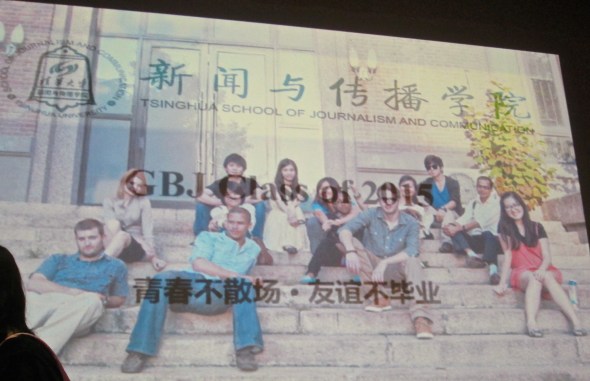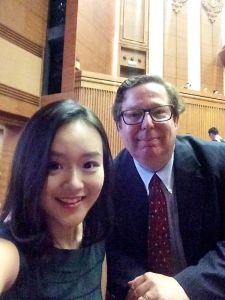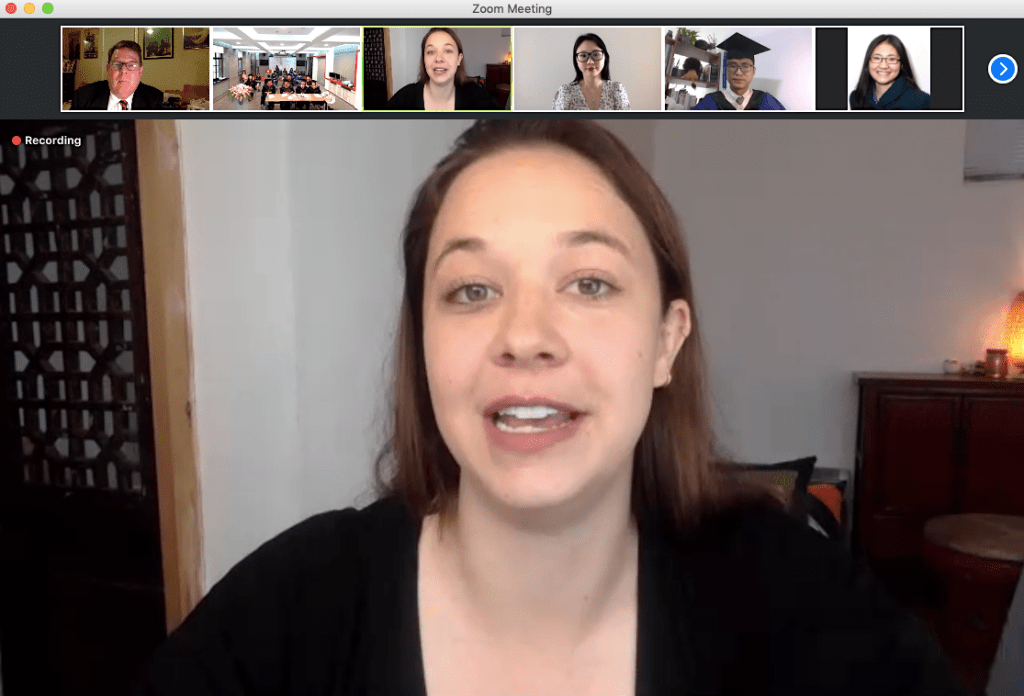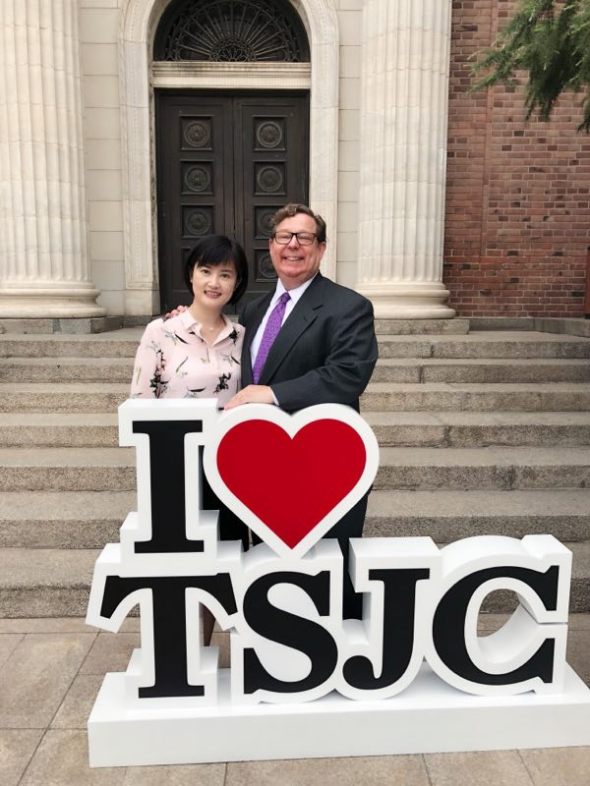The role of a journalist in a time of pandemic and disinformation is to tell the hard truths
Posted: June 24, 2020 | Author: Rick Dunham | Filed under: Breaking news, Dunham's Discourses, Global Business Journalism | Tags: Africa, Asia, Barrows Dunham, Beijing, best practices, China, Chinese economy, commencement, coronavirus, COVID-19, disinformation, George Floyd, Global Business Journalism, global economy, Jemele Hill, Lincoln Steffens, misinformation, pandemic, truth, Tsinghua School of Journalism and Communication, Tsinghua University, United States | 1 Comment
REMARKS BY RICK DUNHAM
GLOBAL BUSINESS JOURNALISM COMMENCEMENT
JUNE 21, 2020
大家好。Добрый день. خوش. Assalaam-o-Alaikum.
Congratulations to the graduating Class of 2020 for enduring the most unusual path to graduation since the global disruptions of the Second World War, or, for Chinese students, since the Cultural Revolution.
I have always been proud of your intelligence and hard work. But, over these past six months, I also have been awed by your grit, your determination and your adaptability.
The coronavirus pandemic has challenged our global institutions: healthcare, economic, governmental, and media. As journalists, we are not only witnesses to history but citizens living through dangerous times. At this perplexing and dangerous time for the world at large – and our media world in particular – it is important for you, the graduating class of 2020, to consider the role of a journalist in a confusing world.
During the pandemic, we’ve had to sort through misinformation, disinformation, stonewalling and cover-ups from people in power. Some governments have become increasingly resistant to transparency and, all too often, to truth itself. We’ve seen social media being used to sow chaos, confusion, hate and civil discord. Reporters in Africa and Asia have been imprisoned for pursuing the truth in defiance of official government lies. My fellow journalists in America have been deemed “enemies of the people” by an ahistorical president who says some of us should be executed for treason.
We are living in a world of parallel media worlds where indisputable truth is in dispute. “What happened?” during massive protests in Hong Kong? Your worldview varies depending on whether you watched Chinese state TV or the BBC. “What happened?” during massive protests in American cities after Minneapolis police killed George Floyd? Your worldview is completely different depending on whether you watched Fox News or almost any other news outlet in the world.
All this leads back to my question: What is the role of journalists in this world? Many people in power, from corporate executives to government officials, believe it is our job to write positive stories about them and to unquestioningly pass along whatever information they present to us.
But Jemele Hill, a prominent African American journalist and writer for the Atlantic, recently suggested a different role for the media. “Journalism is not a profession of being friends,” she said. “Journalism is a profession of agitation. That is what we’re charged to do: to hold everybody accountable, even the people who sign our checks.”
Global best practices are clear. We journalists don’t represent any particular political ideology, political party or nation – although each of us may have ideals, party membership and citizenships. We represent the people, the public, our readers, viewers and listeners. We represent the truth. We are the united nations of truth.
You are the best of global journalism. The Global Business Journalism program is uniquely positioned to improve journalism around the world and to continue improving global understanding of China’s economic role in the world.
At GBJ, we bridge cultural, economic and journalistic divides. We respect others, and their beliefs. We learn from others. We think globally and act locally. We speak truth always. We make the world of journalism and communication a better place.
Since its creation in 2007, the Global Business Journalism program has been the world leader in cross-cultural journalism education. Amid economic growth and economic tumult, China’s role in the global economy is deepening, and our Global Business Journalism graduates are uniquely situated to explain it – factually – to the world.
Every year, I like to conclude my commencement remarks with some words of wisdom from my favorite philosopher, my grandfather, Barrows Dunham. In 1961 he wrote an introduction to “The World of Lincoln Steffens,” a book of articles by America’s leading “muckraking” journalist of the 20th century.
Great journalism, as practiced by Steffens, provides “a hard ground lit by a cool, clear light: the seeing of things as things in fact are,” my grandfather wrote. “The seen reality may indeed be dangerous,” he continued, because so many people cling to “all the comforts of illusion.”
Journalists must shatter those comfortable illusions. “What we need,” Barrows Dunham wrote, “is integrity, intellectual honesty, the clear seeing of the real world.”
For you, the next generation of journalism leaders and global leaders, I wish you clear vision. It is up to you to use your intellectual honesty to make the world a better place after all the missteps of my generation.
谢谢, 大家。 Большое спасибо. Thank you.
GBJ Commencement Address: It’s time to end sexism in journalism. Now.
Posted: July 5, 2018 | Author: Rick Dunham | Filed under: Global Business Journalism, Journalism Training, Rick in the news | Tags: academic freedom, Australia, Azerbaijan, Barrows Dunham, Betty Millard, Burundi, Chen Changfeng, China, civil rights, Confucius, cross-cultural, cross-cultural experiences, Dai Jia, discrimination, Fan Hong, feminism, GBJ, Global Business Journalism, Global Business Journalism Program, Hang Min, hiring, ICFJ, International Center for Journalists, Japan, Journalism, Joyce Barnathan, Korea, Malaysia, Man Against Myth, New Zealand, Pakistan, Rose Li, Russia, sex discrimination, sexism, Singapore, Thailand, Tsinghua University, TSJC, Twitter, United States, We shall overcome, Woman Against Myth | 1 CommentHere is the complete text of my commencement address to the Global Business Journalism graduation ceremony at Tsinghua University on July 5, 2018.
大家好。Добрый день. Welcome.
I am honored, on behalf of the International Center for Journalists and the international faculty of the Global Business Journalism Program, to congratulate all of you on your successful completion of your studies.
This special group includes some of the best young journalists in China, along with a diverse mixture of nations: Japan, Russia, Australia, Malaysia, Singapore, Thailand, Korea, Pakistan, Burundi, Azerbaijan, New Zealand, and the United States. Some of you already have made a mark on the world of business journalism during your Tsinghua years. I have great confidence that even more of you will have an impact in the years to come.
Since 2007, the Global Business Journalism program has improved the quality of journalism – and public understanding of business and economic issues – in China and around the world. You have benefited from cross-cultural learning, practical journalism training, and a varied curriculum featuring both Chinese and international professors at one of the world’s great universities.
In the GBJ program, about three-fourths of our students are women, and with rare exceptions, women are the top performers in our program. Yet many of these high achievers may face obstacles in the job market. Women suffer discrimination, overt and hidden, in hiring, promotion and pay. In many countries, it is acceptable to deny jobs or promotions to women because the employer fears they will become wives and mothers, and will not be as committed to their day jobs as men.
Subtle forms of discrimination continue to subvert women’s empowerment even in so-called progressive countries. A recent study of Twitter use by American political reporters found that of the 25 reporters who received the most social media replies from male political reporters in the United States, zero were women. And whose posts did male reporters share? Only three of the 25 most frequently shared reporters were women. It’s no surprise that the vast majority of “experts” quoted by male reporters tend to be male. It’s time for change.
Joyce Barnathan, president of the International Center for Journalists, was one of 10 prominent media leaders who last month proposed 14 steps to combat industry sexism. “It’s time to stop talking about the need for equality and start actively reforming the industry,” Joyce and the other leaders wrote.
We must overcome these insidious forms of male discrimination. In the words of the American civil rights anthem of the 1960s, “we shall overcome, some day.”
My grandfather, Barrows Dunham, a philosopher, author and professor, wrote a book in 1947 entitled “Man Against Myth.” It analyzed social myths that powerful forces employ to maintain their power.
But a feminist author, Betty Millard, was unimpressed by the title, “Man Against Myth,” and produced her own tract in response: “Woman Against Myth.” She decried the cultural and religious customs cited to subjugate women around the world.
As Millard noted, Confucius wrote many centuries ago: “It is a law of nature that women should be kept under the control of men and not allowed any will of their own.” Confucius, without doubt, was a great man. But he was not always right.
Sadly, Millard’s analysis is still relevant today. A GBJ student, in his thesis this year, argued that Islamic feminists believe that “women’s struggle for equality with men is doomed to fail, as women are placed in ‘unnatural settings’ where they are denigrated and burdened with paid work on top of domestic labor.”
I believe in academic freedom, but I do not agree with the sentiments expressed in this quotation.
Fortunately, the Tsinghua School of Journalism and Communication is leading the way in empowering women. Our executive dean, Dr. Chen Changfeng, is a brilliant scholar and inspirational leader. Our associate dean for international affairs, my friend and GBJ co-director Dr. Hang Min, has earned a global reputation for media management and cross-cultural partnerships. Doctors Fan Hong and Dai Jia are popular GBJ professors, and Li Laoshi, Rose Li, is our indispensable international administrator. And more than half of the keynote speakers at our annual Tsinghua Business Journalism Forums have been women.
You see, women can achieve, if given the opportunity and freed of institutional and societal constraints. I hope that all of you in the graduating class of 2018 take inspiration from the accomplishments of your professors and your peers. It is sometimes harder for women to succeed in journalism. That’s the reality. Men still run most news organizations, and men make most of the hiring decisions. But through persistence and sheer excellence, women are gaining ground. I hope to live long enough to see some of you lead the journalistic, economic and even political worlds of the 21st century.
I close by quoting my favorite philosopher, my grandfather, Barrows Dunham. During a lecture in Massachusetts, he expressed optimism about the battle for social progress. “Even now,” he said, “we ourselves are determining the future, not by knowing what it will be, but by conceiving of what it can be.”
I look forward to you determining the future and changing our world. I will cherish your future achievements, unfettered by ancient superstitions and prejudices. Please stay in touch.
谢谢, 大家。Большое спасибо. Thank you.
Truth matters: A commencement address to Global Business Journalism Program graduates
Posted: June 28, 2017 | Author: Rick Dunham | Filed under: Dunham's Discourses, Global Business Journalism, Journalism Training, U.S. politics | Tags: Bank of America, Barrows Dunham, Belt and Road Initiative, Bloomberg News, Canada, China, Chinese economy, climate change, commencement, Dai Jia, Donald Trump, Fyodor Dostoevsky, Global Business Journalism Program, global economy, Hang Min, ICFJ, International Center for Journalists, Iran, Israel, Italy, James Asher, Jeffrey Ballou, Jim Asher, Journalism, Joyce Barnathan, Kellyanne Conway, Knight Foundation, Lee Miller, Li Xiguang, Liu Binjie, Man Against Myth, National Press Club, National Press Club Journalism Institute, Nelson Mandela, Panama Papers, Shi Anbin, Slovakia, Thailand, The Brothers Karamozov, truth, Tsinghua School of Journalism and Communication, Tsinghua University, Turkey, Uganda, United States, Vietnam, Vjollca Shtylla, Zimbabwe | Leave a commentThis slideshow requires JavaScript.
Here is the text of my address to the 2017 graduating class of the Global Business Journalism Program at Tsinghua University on June 28, 2017.
大家好。Добрый день. Benvenuti. Welcome.
I am honored, on behalf of the International Center for Journalists and the international faculty of the Global Business Journalism Program, to congratulate all of you on your successful completion of your graduate studies.
You are a special group – the best young business journalism minds in China, along with a unique mixture of nations: Iran, Israel, Italy, Vietnam, Thailand, Uganda, Zimbabwe, Slovakia, Turkey, Russia, Canada, and the United States. Some of you already have made a mark on the world of business journalism during your Tsinghua years. I have great confidence that many more of you will have an impact in the years to come, in journalism systems as disparate as Iran, the United States and China.
All of us in this room have our differences – cultural, geographical, even political – but one thing that unites us is the search for truth. As Jim Asher, a 2017 Pulitzer Prize winner for his role in the Panama Papers investigation, said recently: “A world without facts can’t function.”
We live in an unsettling era when the concept of “truth” can be a matter of dispute. Kellyanne Conway, a counselor to Donald Trump, has declared that the White House is entitled to its own “alternative facts.” Whatever that means.
To the graduating class of 2017 and your proud professors, that’s just plain nonsense. We owe it to the public, whether we operate in the United States, China, or anywhere around the world, to share the truth, as best as we can tell it, and to explain what the truth means to our audience. As the 2017 National Press Club president, Jeffrey Ballou, said to fellow American journalists in Akron, Ohio: “Truth is not a game at all.”
The esteemed Russian author Fyodor Dostoevsky, in Братья Карамазовы, The Brothers Karamazov, summed up the predicament of the perpetual prevaricator. “The man who lies to himself and listens to his own lie,” he wrote, “comes to a point that he cannot distinguish the truth within him, or around him, and so loses all respect for himself and for others.”
We must respect knowledge, respect truth, and respect ourselves. We owe it to the global public to use the knowledge we have gained about China and about global economics to provide our audiences with intelligent, insightful and factual reports. With your newfound expertise on the Chinese economy, globalization, corporate strategies and much more, you can communicate clearly and comprehensively, on any multimedia platform, about issues ranging from the Paris climate change accords to the Belt and Road Initiative.
One of my favorite philosophers, Nelson Mandela, said that “a good head and good heart are always a formidable combination. But when you add to that a literate tongue or pen, then you have something very special.”
You have something very special – tools that you can use to make the world a more informed and a more just place. Because, as our dean, Liu Binjie, said in his speech welcoming many of you to the Tsinghua School of Journalism and Communication in September 2016, “Justice is the soul of the news.”
Barbara Cochran, my successor as president of the National Press Club Journalism Institute in Washington, reminds us that truth is an imperfect pursuit, and journalists are imperfect people. “All news organizations make mistakes from time to time,” she said recently, “but they are trying to tell the truth and generally do it well.”
Truth and justice. The Global Business Journalism program has been trying to live up to the highest international standards for the past 10 years. Since 2007, the GBJ program has combined rigorous academics with practical journalism training in a cross-cultural setting at one of the world’s great universities.
Thanks to the vision of brilliant minds such as Professor Li Xiguang, ICFJ president Joyce Barnathan, and ICFJ vice president Vjollca Shtylla, the GBJ program was created. Thanks to the financial and journalistic support of Bloomberg News, ICFJ, the Knight Foundation and Bank of America, it has grown and prospered. Thanks to the commitment of Tsinghua leaders like Dr. Hang Min, Dean Shi, Dean Chen, Dean Hu, Professor Lee Miller, Professor Dai Jia, and many more, it has a bright future. Thanks to dedicated and high-achieving alumni from some 60 countries, GBJ is improving the quality of journalism – and public understanding of economic issues — in China and around the world.
I close by quoting my favorite philosopher, my grandfather, Barrows Dunham. In his 1947 book Man Against Myth, he concluded that understanding the truth was necessary to overcome society’s myths. “With words, as with knowledge generally,” my grandfather wrote, “there can be no substitute for constant analysis of fact.”
Truth. Justice. Words. Knowledge. Tsinghua. That pretty much sums it up. Congratulations on your achievements in the Global Business Journalism Program. I look forward to your truth-telling in the years to come.
谢谢。Thank you.
Global Business Journalism Program: Leading the next generation of journalism around the world
Posted: July 4, 2016 | Author: Rick Dunham | Filed under: Discovering China, Dunham's Discourses, Global Business Journalism, Journalism Training, Uncategorized | Tags: Bank of America, Barrows Dunham, Bloomberg News, China, commencement, Cynthia Chen, Gaelle Patricia Chekma, Global Business Journalism, Global Business Journalism Program, ICFJ, International Center for Journalists, Jade Ladal, Jarchine Zhou, Jiao Jie, Jordyn Dahl, Journalism, journalism education, journalism ethics, Journalism Training, Knight Foundation, Media Economics, philosophy, Tsinghua University, Zhou Jaxin | Leave a commentThis slideshow requires JavaScript.
It has been a honor to serve as international co-director of the Global Business Journalism Program at Tsinghua University for the past three years. Here is a transcript of my remarks at the 2016 commencement on June 30:
This is a very special day for all of us. To you, the graduating class of 2016, it is the culmination of a multicultural, global experience that is certain to benefit you personally and professionally. For me, this day is very special, too.
This is the first group of Chinese students I taught at Tsinghua, and you have made this veteran journalist into a better professor and a better person. Jiao Jie, Cynthia, Jarchine. I could go on and on. I have such respect and affection for you. I am so proud of all of you.
This is the first group of international students I interviewed, taught and mentored from beginning to end. Jade: you may not remember it, but I recall asking you in your interview: Who was your favorite character from En Attendant Godot? (I bet you didn’t prepare for that question.)
From the beginning, I can remember being supremely impressed by the qualifications and enthusiasm of Lauren and Gaelle, who have been leaders and high achievers since the day they arrived.
And I can remember recruiting Jordyn as if she were a star athlete in the United States and I were an eager coach. I knew she would be an invaluable addition to our program. Even while she’s still in school, she’s published superb articles in Forbes and Beijing Review, respected global news outlets.
I am honored, on behalf of the faculty of the Global Business Journalism Program and the International Center for Journalists, to congratulate all of you on your successful completion of graduate studies at the Tsinghua School of Journalism and Communication.
You are entering an uncertain world of journalism … of business and economics … of geopolitics and global conflict. I guess any commencement speaker could have said that at any time. But the pace of technological change, the immediacy brought by social media and 24/7 news, and the interconnectedness of the world, have made it easier for human beings to create positive things — or sow destruction anywhere, anytime.
The disruption created by the digital communications revolution has affected businesses from Dallas to Da Tong. In our world of journalism and communication, traditional forms of communication are collapsing – rapidly in America and Europe, more slowly in China. But make no mistake about it, the old world is gone and will never be revived, despite the antediluvian longings of ultranationalists and isolationists and technophobes.
The good news is that there are so many opportunities for people who embrace change and embrace the latest technologies. You are among the fortunate few. You have been trained in the latest technologies, but you also understand the enduring basics of journalism: accuracy, fairness, accountability, ethics and compelling storytelling. The Global Business Journalism program is a combination of a rigorous academic education taught by some of the finest professors in China, and a real-world journalism newsroom where students learn from distinguished journalists from around the world and create professional multimedia projects and data journalism reports.
With the skills you have learned, and the intelligence and drive you bring to your work, I have no doubt some of you are going to be journalism industry leaders and innovators, in China and around the world.
The Global Business Journalism Program is about to begin its tenth academic year this fall. In its first decade — with the support of Bloomberg News, ICFJ, the Knight Foundation and Merrill Lynch/Bank of America — it has brought together students from about 60 countries to experience a diversity of cultures and ideas.
The GBJ program has been indispensable in creating a new generation of business journalists who are reshaping and improving journalism in China. Not only does Chinese journalism benefit from our superbly trained alumni, but international journalism benefits because the next generation of reporters from Cameroon to California have a more accurate and sophisticated view of the Chinese economy and its role in global growth – and an understanding of the highest standards in global reporting.
What’s more, GBJ has created de facto goodwill ambassadors for China in dozens of countries throughout Africa, Asia, Europe and the Americas. It could not come at a more important time.
The journalism industry is facing an era of limits. In the United States and Europe, those limits are mostly economic: the profit imperative at a time of declining revenues, the mistaken choice of click bait journalism over quality. In China, those limits are mostly political.
But neither the journalism establishments of China nor the rest of the world can afford to be reactive. Traditional news outlets, whether in Beijing or Great Britain, are at risk of losing the next generation of information consumers to social media or alternative sources of information. We must – and we will –adapt, to create innovative new ways to share news.

Barrows Dunham, 1947
I would like to close by quoting from my favorite philosopher, who happens to be my grandfather, Barrows Dunham. Seventy years ago, as the world emerged from the destruction wrought by fascists, he wrote in his book Man Against Myth that the peoples of our planet faced “ambiguous gloom, which may perhaps be twilight and may perhaps be dawn.”
Sounds like today. Looking at the pace of change, he wrote in 1947:
“In our day, indeed, events have attained so formidable a tempo that a single lifetime … will seem to contain more than there once appeared to be in history itself.”
Sounds like today.
Every generation sees an unprecedented pace of social change. That is the reality of human accomplishment, and human nature. There are always those who see the dawn and those who see the sunset. In the dawn of our new era, many in our chosen line of work will resist the changes that are needed.
This challenge reminds me of the Season 6 finale of Game of Thrones – specifically, the reaction of the receptionist at the Citadel, who, in response to a message delivered by Samwell Tarly, told our hero: “This is highly irregular.”
“Well,” Samwell responded, “I suppose that life is irregular.”
Indeed, life is irregular. But we can’t respond to occasional irregularities by retreating or taking the safe path. We must pursue the ambitious vision we learned in GBJ.
As all of you know, I am an optimist. I choose to see the dawn. I don’t fear the future, and you should not, either. You are uniquely prepared to be the change – to lead the change – as we approach the third decade of the 21st century.
To quote Dr. Dunham one last time: “Even now, we ourselves are determining the future, not by knowing what it will be, but by conceiving what it can be.”
Congratulations to the GBJ graduating class. Good luck to all of you. Thank you.
Global Business Journalism students are improving the quality of journalism in China and around the world
Posted: July 12, 2015 | Author: Rick Dunham | Filed under: Global Business Journalism, Journalism Training, Rick in the news | Tags: Bank of America, Barrows Dunham, Bloomberg News, CCTV, China, China Daily, Chinese economy, commencement, Data Journalism, Global Business Journalism, graduation, Hang Min, House Un-American Activities Committee, ICFJ, International Center for Journalists, Jin Jianbin, Lee Miller, multimedia journalism, Radio Beijing, Red Scare, Shi Anbin, Tsinghua University, Xinhua, Zhang Sihan | Leave a comment
A talented group of global journalists, including the first graduates from Nepal, Jamaica and Ukraine.
I am so excited about the opportunities I have had in China to work with journalism students — both international and Chinese — and professional journalists to improve the caliber of reporting and writing in China, and to prepare us all for the Brave New World of journalism in the Digital Age. Here is a transcript of my speech at the July 10 commencement of the Tsinghua School of Journalism and Communication Global Business Journalism Program.

Speaking to the 2015 graduating class of the Global Business Journalism Program at Tsinghua University.
I am honored, on behalf of the faculty of the Global Business Journalism Program, to congratulate you on your successful completion of graduate studies at the Tsinghua School of Journalism and Communication graduation.
It indeed has been an adventure – a voyage of discovery – for all of us. You represent the best of China and the best of the world.
Over the past eight years, students from more than 50 countries have studied together, worked together, gotten to know each other here in the Global Business Journalism Program at Tsinghua University. Ours is a vibrant tapestry of cultures and ideas. You have been exposed to new perspectives, whether they are from the minds of brilliant Chinese professors or veteran international journalists who have plied their trade at the highest levels in the United States and around the world. All of us have gained a better understanding of the rapidly changing world we are inheriting, the rise of China and the rapid transformation of its economy, the complicated dynamics of our interdependent global business world, the rapid transformation of our own world of journalism and the imperative to learn new multimedia and data skills to compete in the emerging journalism marketplace. You have been tested with rigor. You have passed the test. I am so proud of you.
Eight years ago, the Global Business Journalism Master’s Degree Program was just a dream, an idea conceived by some exceptionally creative souls at Tsinghua University in Beijing and at the International Center for Journalists in Washington. In just a few years, it has gained tremendous respect throughout China and around the world, attracting renowned international scholars and Pulitzer Prize winning journalists to work with our students and share their wisdom and their skills.
From the beginning, the GBJ program has been nurtured by the invaluable and incalculable support of Bloomberg News, with its unprecedented gift of ten of its priceless terminals, a series of guest lecturers and events, and a wonderful faculty member named Lee Miller.

One of Tsinghua’s finest, Zhang Sihan, is heading to Columbia University to pursue a dual master’s program in journalism and public policy.
And special thanks to my partner in the program, Dr. Hang Min, for her support, her wisdom and her guidance in making the GBJ program an invaluable resource for global journalism. Under her leadership, we have offered some of the most advanced classes in communication theory, as well as practical, advanced skills that will help our graduates succeed in their chosen field of endeavor, whether that be global business journalism, business, journalism, or something else somewhere on this globe.
By setting exacting standards and requiring rigorous coursework, the GBJ Program has helped to improve business journalism in China by training a new generation of highly qualified journalists specializing in economics and business. Our Chinese graduates now work at some of the most important media outlets in China, such as China Daily, Xinhua News Service, CCTV, and Radio Beijing, as well as at important international media outlets such as Bloomberg News.
That is a testament to the quality of our alumni. It also is a testament to the iron will of friends in the Tsinghua School of Journalism and Communication who have exhibited an unwavering commitment to our success and our continuing growth. Dr. Shi Anbin has been a champion of our cause and a special mentor to me as a newly minted college professor. Thanks, Dean Shi, for everything you have done to make GBJ what it is today, and thanks to Dr. Jin Jianbin and other school officials for their support.
Of course, as all of us know in business journalism, you can’t have an entrepreneurial venture without some venture capital. I would like to thank our founding sponsor, Bank of America, for its steadfast commitment to the program since 2007.
I would like to close by quoting from my favorite philosopher, who happens to be my grandfather, Barrows Dunham. Despite a turbulent professional career that included an unwelcome appearance before the U.S. House Un-American Activities Committee and a spot on the American blacklist during the Red Scare Era of the 1950s, my grandfather, a distinguished philosophy professor and internationally acclaimed author, never lost his sense of patriotism or optimism.
“Even now,” he once wrote, “we ourselves are determining the future, not by knowing what it will be, but by conceiving what it can be.”
None of us know what the future will hold. But with the knowledge we have gained at Tsinghua, the support of our families – and, yes, the Global Business Journalism family – we can conceive that better future.
Congratulations to the Tsinghua Global Business Journalism graduating class. Good luck to all of you. Thank you.


















Recent Comments